In the late ’00s, Franklin James Fisher, overeducated with his master’s degree, took a job at a Manhattan nightclub. While working in the coat-check room, he made good and efficient use of his time, channeling the sounds of drunkenness into song lyrics. Fisher set these lyrics to music in Algiers, a lean and powerful band that takes cues as much from politics and literature as from gospel and punk.
Algiers released a self-titled debut in 2015, but the group’s roots go back much further. Fisher and two of his bandmates—bassist Ryan Mahan and guitarist Lee Tesche—first played music together in the mid-1990s, when they met as high school students in suburban Atlanta.
Though years later Fisher, Mahan, and Tesche found themselves living in three different countries while pursuing graduate degrees. They maintained their collaboration through file sharing and through a shared collection of influences—musical, literary, and philosophical—on Tumblr.
On Algiers’ sophomore release, The Underside of Power, the group is joined by Bloc Party’s Matt Tong on drums. The album is dark and urgent and is clearly, as the name suggests, a response to the current political climate, touching on the sense of oppression and dystopia that many are feeling.
But regardless of your political orientation, the album has a lot to recommend to guitar fans—killer riffs galore, with all kinds of uncanny textures and oddness percolating beneath the surface.
You’re both products of Atlanta. How has that impacted your music?
Franklin James Fisher: It was probably different for both of us. I remember always romanticizing these other places and other music scenes, like in New York and the U.K. It wasn’t until I left Atlanta that I was able to look back at it from a different perspective and kind of appreciate a lot of things that were going on—things that over the last 20 or so years I wasn’t so privy to.
I think also about the opportunity it gave us, growing up in a place where there’s a lot of space, because it kind of dictated the music we made. It was really easy to be in a full band with drums, and play in people’s garages and basements. You could have seven members and play a lot of different instruments and have two drum kits and all this stuff, because the space allowed for it, whereas you move to a bigger city and you must be economical with how you approach things.
Lee Tesche: Growing up in Atlanta in the ’90s, the hip-hop and stuff here obviously had an influence on us. At the same time, we were looking at some of the music scenes we grew up listening to as well, like in Bristol, in the U.K. A lot of that ’90s hip-hop stuff was coming out, with people combining these ideas with guitars and full-band instrumentation with sampling and beat-making, throwing all this stuff into a blender and sometimes ending up with really exciting results.
Fisher: It’s definitely a combination of those two aspects: making that impact on what you’re doing depending on where you are and what’s going on at the time. It’s definitely an issue of space and your immediate surroundings. When you’re younger it may have to do more with how you access music and what’s going on with where you are.
But it plays increasingly less of a part as we enter this new—I hate the term but, global village or whatever—with the internet. I was hanging out with Randall Dunn, who mixed the record. He was talking about how they don’t have these scenes anymore in different cities, because there’s no localized music scenes that just kind of exist in one pocket or another. Everything’s kind of been homogenized by the internet. Internet seems to be shorthand for capitalism. That’s really what it is.
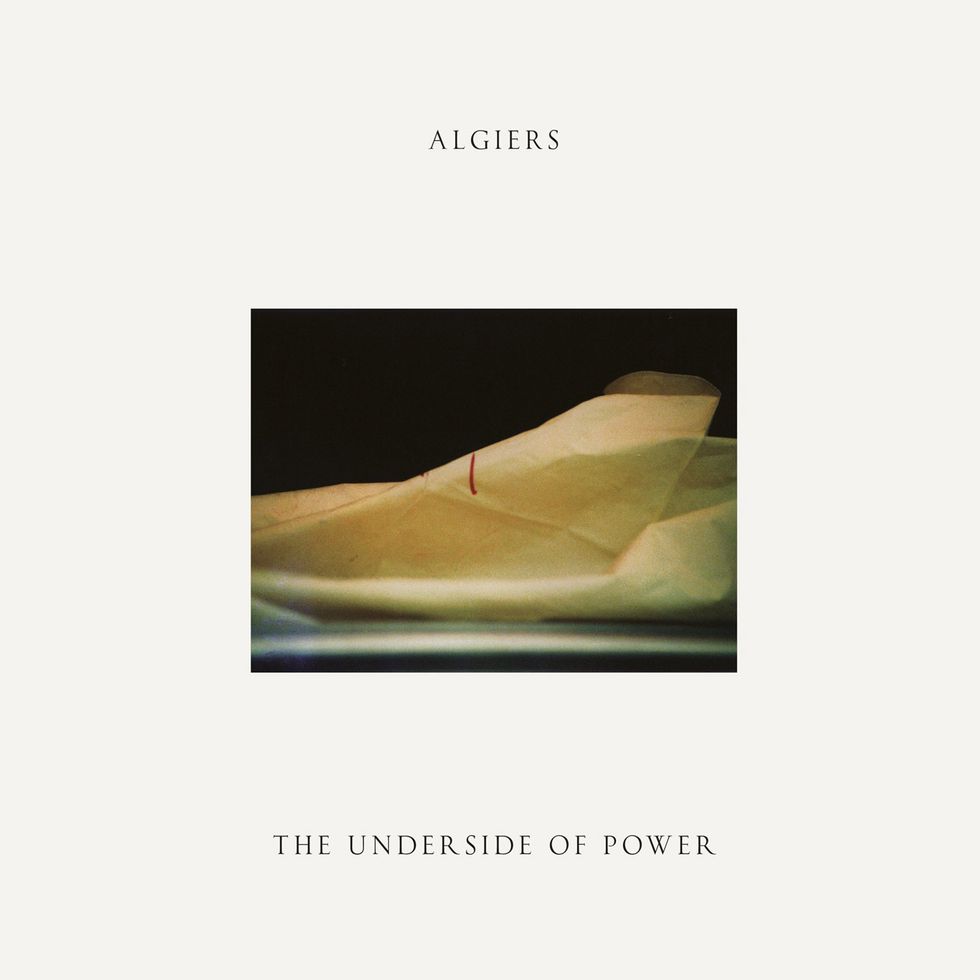
The Underside of Power was largely written in minor keys. “Ryan [Mahan, bassist] talks about a sense of melancholy, a sadness that’s embedded in the band’s ethos and one we try to communicate,” says Franklin James Fisher. “There’s sort of an unofficial mandate in the band that we can’t really do major-key songs.”
Talk about the gospel influence on your sound. Does it come from first-hand participation in the church?
Fisher: For me, it does. Not really for the other guys. It took a long time for me to try and find my voice, as it were. In the early days, Ryan [Mahan] and I would put songs together and we would both try singing on them. It took a while to get right. Eventually he told me to just kind of approach it in the most natural way that I could, and for me that was just kind of…. I have a very loud voice and really was imitating what I heard in church and what I heard from Motown and soul records and things like that.
It was just like shouting, scream-singing almost. And then when we first demoed [2015’s] “Black Eunuch,” I think we felt as if we touched upon a nerve there. It was an interesting combination of punk aesthetics and gospel aesthetics and there was a synergy. So we started kind of playing with that. That was much more featured on that first record and I think a lot of people could tell just because they’re strange bedfellows.
Tesche: For me, rhythm and blues and gospel and jazz are the bedrock of everything. Everything that’s come in the last 50 years sprung forth from that, so it’s not that alien a thing to have these reference points in your music. I feel all the British Invasion stuff I discovered as a teenager, and getting into my parents’ old soul and Motown and doo-wop and gospel stuff, gave me kind of a belief system, in a sense.
What about that punk-rock influence on your music?
Tesche: I think the punk-rock reference is a great one to bring up, because as a teenager that was something that also came to me. When I was 14 a friend’s older brother played in a hardcore band, and I saw them play downtown [in Atlanta] at one of the dingy, dive-y clubs. I’d never experienced anything like that before. It was this big sing-along. I was like, “I want to be part of this.” It just changed my entire musical outlook, and I think for me it’s always just been about maintaining that, remembering what music is and where it comes from and what expression is, and not being afraid of that.
Algiers frontman Franklin James Fisher modded his Telecaster Deluxe with coil-tap selectors. He uses a Whammy for abstract guitar parts, which he approaches like “echoes of an idea—like it bypasses tonality of any sort.”
Photo by Jordi Vidal
Are you both back in Atlanta these days?
Fisher: Lee’s in Atlanta; I’m in New York.
So how do you work together? Do you swap files and then meet up to rehearse before you go in the studio?
Fisher: Yeah, that’s pretty much it. We get together about a week or so before we go on tour and have intensive rehearsals. Even when we were in the studio for this record, there was never a point really where the four of us sat down and jammed our songs to work them out.
Tesche: For the last record, we kind of wrote separately. We did some stuff in the studio, but we hadn’t really played live as a group and we didn’t really know how it would go. And then once Matt Tong started playing drums with us, we toured heavily, and playing together every night we got really tight.
The only slight detriment is that we wrote a lot of the record and then we had to learn it. It was interesting because we were playing these songs that we hadn’t necessarily totally finished writing, and suddenly it was like, “Oh, this song should end like this.” You have to actually play the music sometimes before it starts making sense from a compositional standpoint.
—Franklin James Fisher
So how did you record the new album, living in different places? Did you get together and kind of recreate what you played on the files? Or is the recording a composite of things that you recorded separately?
Tesche: For the last record, we spent time in the West Country in England, outside of Bath, and went in with a handful of these little demos and scraps that we had cobbled together. We pretty much try to do most of our finishing of the process—with people fleshing out their parts and arranging things—once we get into the studio.
Fisher: Everything’s pretty straightforward. I don’t think this record was written all individually or in separate places like the last record was, but it still was a bit of an abstracted, different process. It was rather fractured. We came in and sat down and rehearsed all the songs together in a preproduction stage or even demoed as a group. The process can drag on a little bit more and then you’re burning time and money. So we ended up having to finish a lot if it in different studios, depending on where we were all able to get together. It worked out okay, but it’s obviously never ideal. On the other hand, there’s really no right way to make a record.
It sounds as if all or most of the guitars on the record are in an unusual tuning.
Tesche: I pretty much exclusively used one tuning. Sometimes we get in the studio and I’ll just start experimenting and fooling around, adding the kinds of drones and discordant tones you can get with open tunings. Then, I have to go back and try to figure out what I did. It must have been way down to C–A–C–C–C–A or something like that. I’ll have to check [laughs].
Franklin James Fisher’s Gear
GuitarFender Telecaster Deluxe
Amp
Vox AC30CC2
Effects
Boss DS-1 Super OverDrive
DigiTech Whammy
Marshall Shred Master
Strings and Picks
Whatever .010 sets are available
Medium teardrop-shaped picks (any brand)
So much of the album is in a minor key. Was that intentional?
Fisher: Ryan talks about a sense of melancholy, a sadness that’s embedded in the band’s ethos and one we try to communicate. He is very much against major keys. There’s sort of an unofficial mandate in the band that we can’t really do major-key songs. That’s also ironic because he wrote the chorus of the single “The Underside of Power,” which is very major key. People seem to really like it. I know I do.
Tesche: Just by nature, we—both as individuals and collectively—write predominantly in minor keys. And it’s interesting: I was noticing just the other day how, on “Mississippi Goddam,” Nina Simone goes between major and minor keys. That was something I got, maybe subconsciously, but I never quite understood. And the more I start to investigate that, I think it’s quite brilliant.
Fisher: It’s just nice to play tricks, too, though. Speaking of Nina Simone, she used this Bach fugue trick on “Four Women”—the entire thing is in a minor key and then it resolves in major. It would be fun to play around with some things like that.
A Picardy third, it’s called. This is a guitar magazine, so I’d be remiss not to ask: What kind of guitars do you play?
Tesche: My main guitar is kind of like a Mosrite–Travis Bean hybrid. Over the years, I put together a box of parts of all my favorite guitars, and I had a luthier combine them all into this kind of Frankenstein guitar.
Fisher: I play a Mexican Telecaster Deluxe. I modified it so it’s got coil-tap selectors.
Lee Tesche’s main guitar is a Mosrite–Travis Bean hybrid. “Over the years, I put together a box of parts of all my favorite guitars, and I had a luthier combine them all into this kind of Frankenstein guitar,” he says. Photo by Jeff Ryan
Tesche: I use a Vox AC30, one of the newer ones, the AC30CC2.
Fisher: Anything Vox is good. I really like their clean tone. It took me a long time to figure out that what’s most important to me about an amp is its clean sound, and that I can take care of the rest with pedals
Tesche: Yeah, I went through a whole decade of learning what amp I actually like playing through. For years, I played through Marshalls and Soldano heads, like the SLO100, before I finally ended up getting an AC30. It was like, “Oh, this is actually the sound that I’ve been looking for all along.”
—Lee Tesche
On the record, there are lots of unusual effects. How, for instance, did you create the soundscapes in the interlude of “Cleveland?”
Fisher: Yeah, there are those weird sounds that are kind of intermingled with sounds of people crying and weeping and I’m screaming on top of it. It’s like all these sounds are kind of marrying each other. That’s something I did with my [DigiTech] Whammy.
What inspired you to do that?
Fisher: I wanted to have some sort of really abstracted sound, like what Lee does with the guitar on “Blood.” It’s so abstracted that it’s almost just the echoes of an idea—like it bypasses tonality of any sort. On the demo, I had some shitty guitar placeholder thing.
Lee Tesche’s Gear
Guitar1965 Mosrite Combo semi-hollow, with aluminum neck and Travis Bean pickups
Amp
Vox AC30CC2
Effects
Ampeg Scrambler Bass Overdrive
Boss RE-20 Space Echo
Reuss ET-01 Evil Twin
Strings and Picks
Whatever .010 sets are available
Dunlop .73 mm
I was fooling around with it while I was on the road and after a while, for some reason we would play a show and my pedal wouldn’t work or my board would get messed up, and so I would just scream into a delay pedal. Later on, Lee told me maybe I should try to bring that back for the record because it was quite effective. All of these sounds just kind of comingled in the sound of pain and despair.
Speaking of pain and despair, can you discuss how the record is informed by the current political climate?
Fisher: Sure. Things seem to be reaching a fever pitch, particularly with oppressed people, refugees, and minorities. Some people call us a political band. We deal with a lot of social issues in our work, so we’ve kind of always talked about these things. It’s not like we set out to write about what would be happening in the next four months, but those things that we’ve always been talking about have gotten magnified in the past year or so.
Tesche: As an artist, it’s kind of impossible for it not to permeate into your work, whether you’re conscious of it or not. It’s just kind of a byproduct of the current situation that we’re in. To reiterate what Frank said, it’s something that’s always prevalent in our music, and it’s definitely going to be impacted by what’s going on around us and in the world.
YouTube It
Algiers opens an intimate performance on Seattle’s KEXP with “Blood” from their self-titled 2015 debut album. Skip to 4:45 to scope some of Tesche’s choice atmospheric playing.


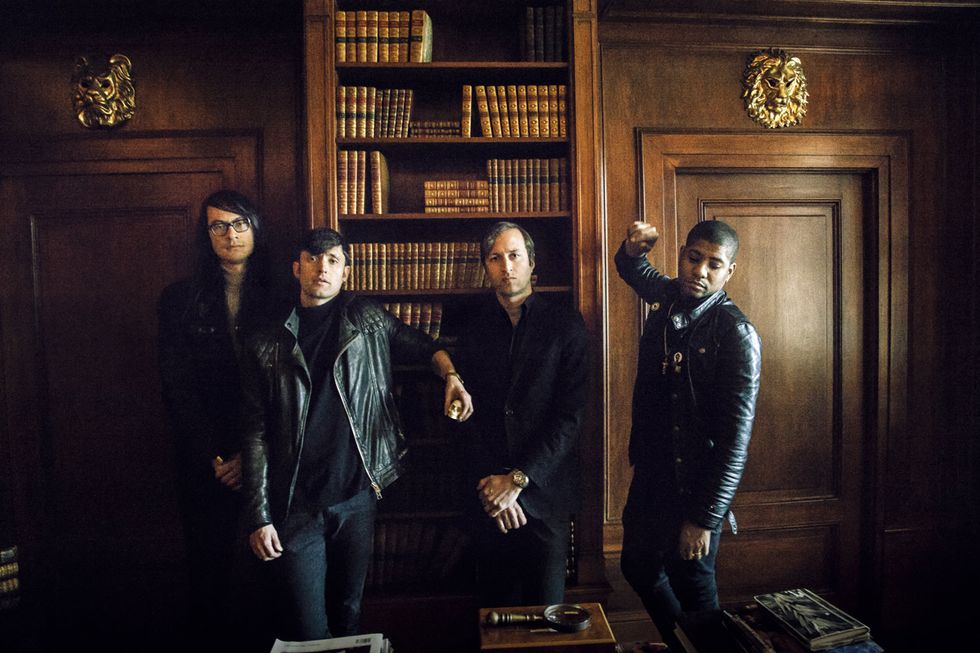

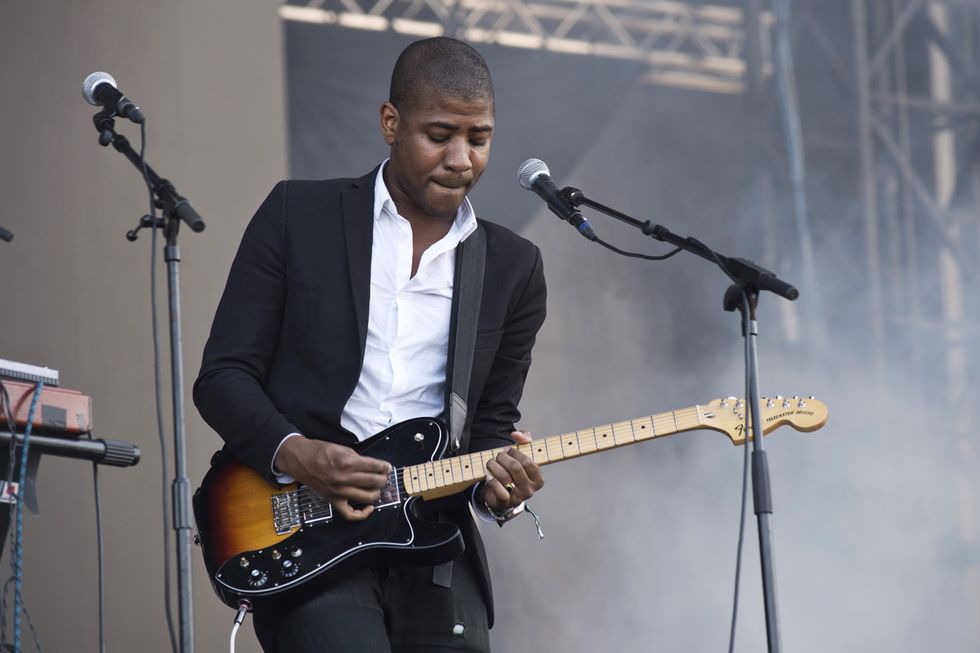






![Rig Rundown: Russian Circles’ Mike Sullivan [2025]](https://www.premierguitar.com/media-library/youtube.jpg?id=62303631&width=1245&height=700&quality=70&coordinates=0%2C0%2C0%2C0)

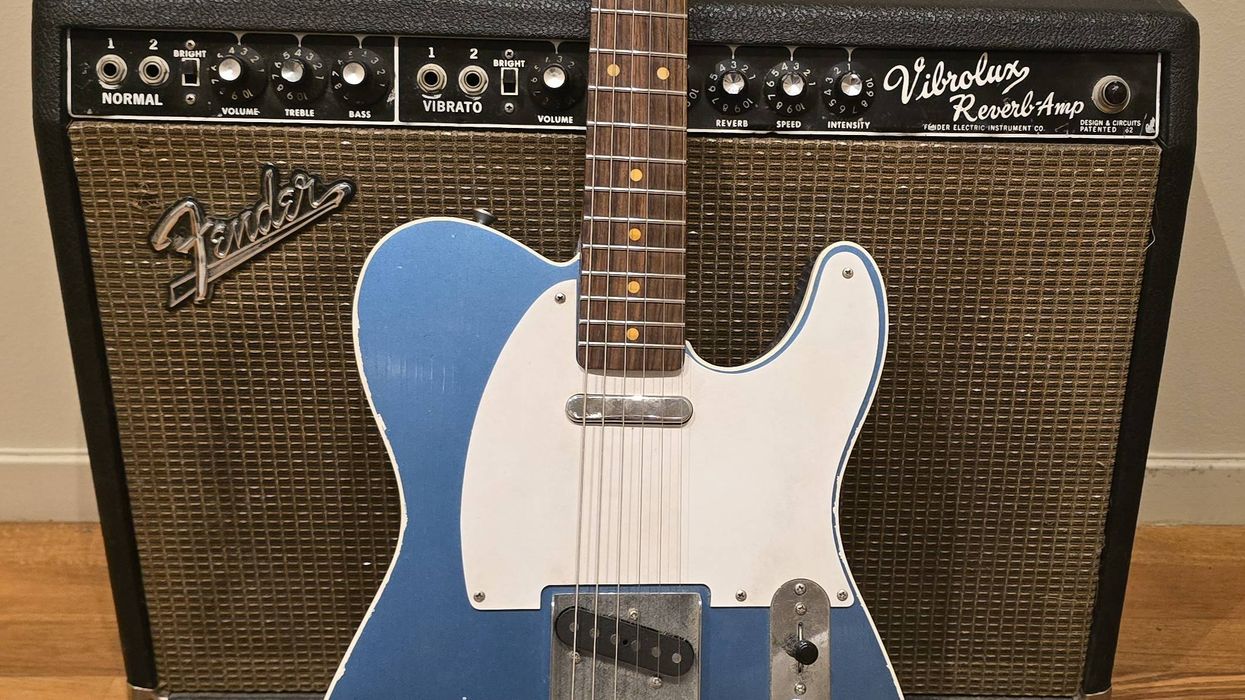
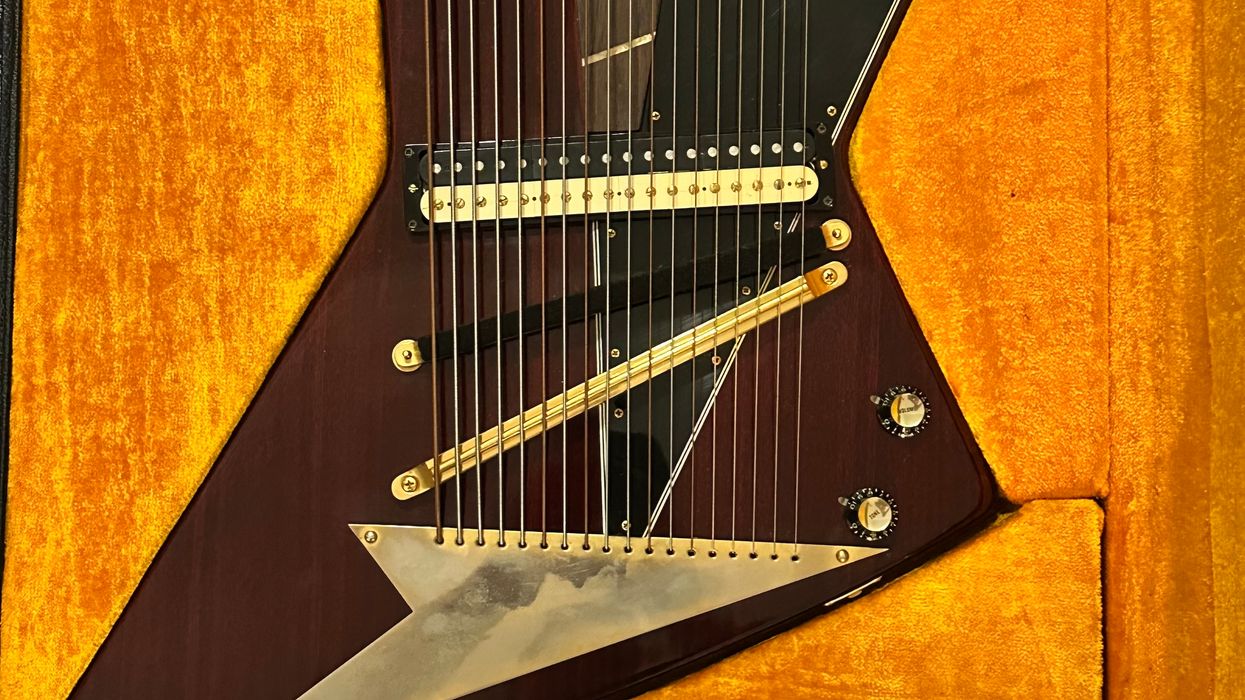
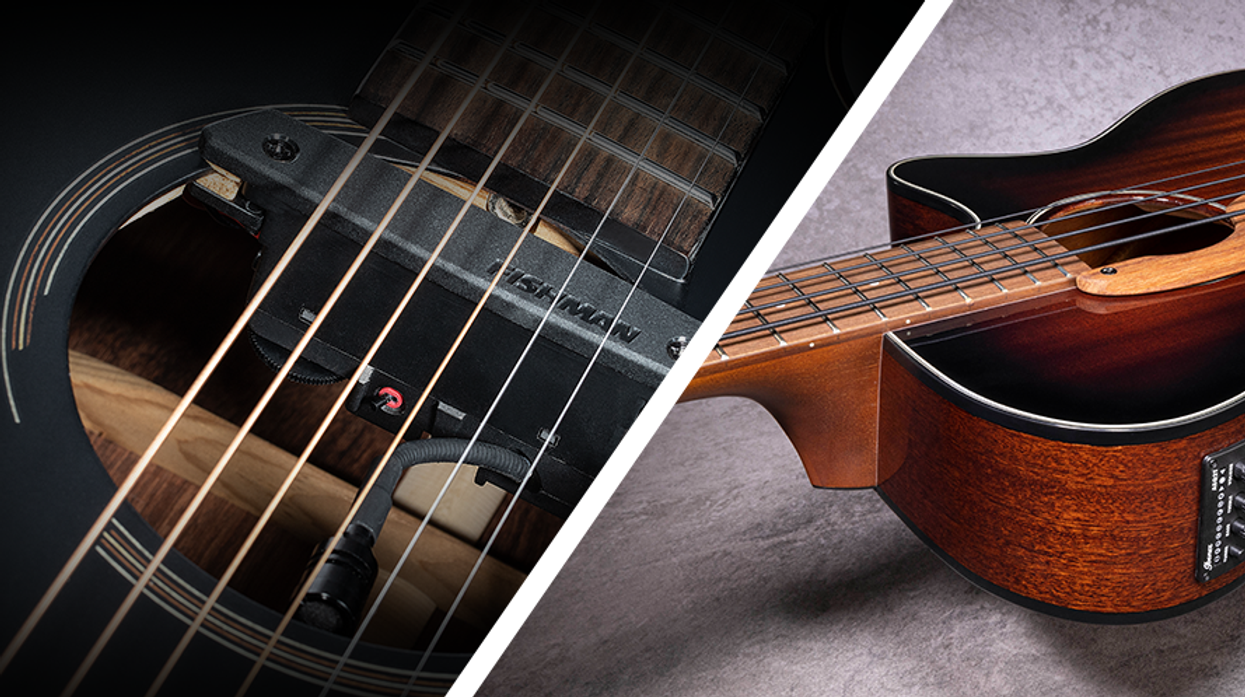
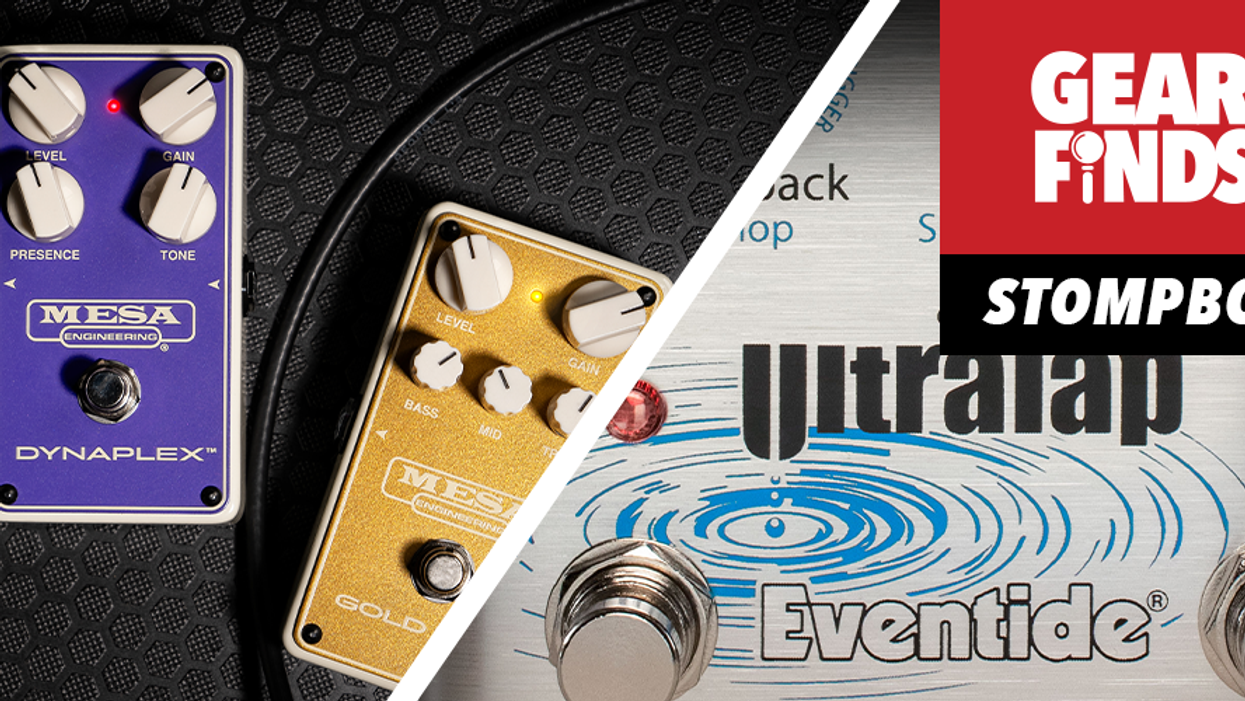










![Rig Rundown: AFI [2025]](https://www.premierguitar.com/media-library/youtube.jpg?id=62064741&width=1245&height=700&quality=70&coordinates=0%2C0%2C0%2C0)




















 Zach loves his Sovtek Mig 60 head, which he plays through a cab he built himself at a pipe-organ shop in Denver. Every glue joint is lined with thin leather for maximum air tightness, and it’s stocked with Celestion G12M Greenback speakers.
Zach loves his Sovtek Mig 60 head, which he plays through a cab he built himself at a pipe-organ shop in Denver. Every glue joint is lined with thin leather for maximum air tightness, and it’s stocked with Celestion G12M Greenback speakers.











